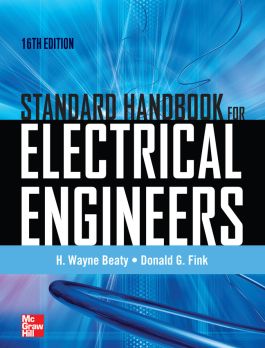Standard Handbook for Electrical Engineers Sixteenth Edition
Step 1. Download Adobe Digital Editions Both PC and Mac users will need to download Adobe Digital Editions to access their eBook. You can download Adobe Digital Editions at Adobe's website here.
Step 2. Register an Adobe ID if you do not already have one. (This step is optional, but allows you to open the file on multiple devices) Visit account.Adobe.com to register your Adobe account.
Step 3: Authorize Adobe Digital Editions using your Adobe ID. In Adobe Digital Editions, go to the Help menu. Choose “Authorize Computer.”
Step 4: Open your file with Adobe Digital Editions. Once you’ve linked your Adobe Digital Editions with your Adobe ID, you should be able to access your eBook on any device which supports Adobe Digital Editions and is authorized with your ID. If your eBook does not open in Adobe Digital Editions upon download, please contact customer service
Section 2. Electric and Magnetic Circuits
Section 3. Measurements and Instruments
Section 4. Properties of Materials
Section 5. Generation
Section 6. Prime Movers
Section 7. Alternating-Current Generators
Section 8. Direct-Current Generations
Section 9. Hydroelectric Power Generation
Section 10. Power System Components
Section 11. Alternate Sources of Power
Section 12. Electric Power System Economics
Section 13. Project Economics
Section 14. Transmission Systems
Section 15. Direct Current Power TransmissionvSection 16. Power-System Operations
Section 17. Substations
Section 18. Power Distribution
Section 19. Wiring Design for Commercial and Industrial Buildings
Section 20. Motors and Drives
Section 21. Industrial and Commercial Applications of Electric Power
Section 22. Power Electronics
Section 23. Power Quality and Reliability
Section 24. Grounding Systems
Section 25. Computer Applications in the Electric Power Industry
Section 26. Illumination
Section 27. Lightning and Overvoltage Protection
Section 28. Standards in Electrotechnology, Telecommunications, and Information Technology
For more than a century, the Standard Handbook for Electrical Engineers has served as the definitive source for all the pertinent electrical engineering data essential to both engineering students and practicing engineers. It offers comprehensive information on the generation, transmission, distribution, control, operation, and application of electric power.
Completely revised throughout to address the latest codes and standards, the 16th Edition of this renowned reference offers new coverage of green technologies such as smart grids, smart meters, renewable energy, and cogeneration plants. Modern computer applications and methods for securing computer network infrastructures that control power grids are also discussed. Featuring hundreds of detailed illustrations and contributions from more than 75 global experts, this state-of-the-art volume is an essential tool for every electrical engineer.
Standard Handbook for Electrical Engineers, 16th Edition, covers:
Units, symbols, constants, definitions, and conversion factors * Electric and magnetic circuits * Measurements and instruments * Properties of materials * Generation * Prime movers * Alternating-current generators * Direct-current generators * Hydroelectric power generation * Power system components * Alternate sources of power * Electric power system economics * Project economics * Transmission systems * High-voltage direct-current power transmission * Power system operations * Substations * Power distribution * Wiring design for commercial and industrial buildings * Motors and drives * Industrial and commercial applications of electric power * Power electronics * Power quality and reliability * Grounding systems * Computer applications in the electric power industry * Illumination * Lightning and overvoltage protection * Standards in electrotechnology, telecommunications, and information technology

